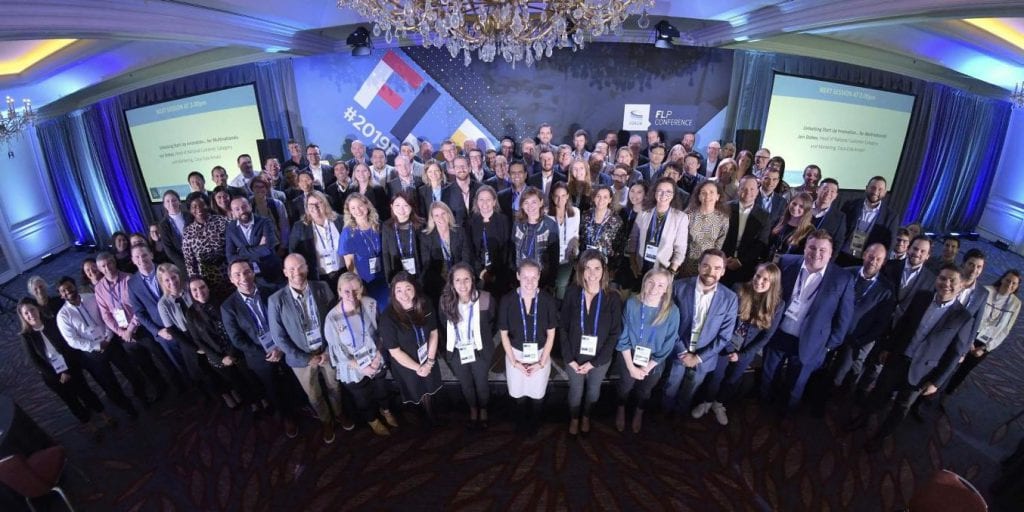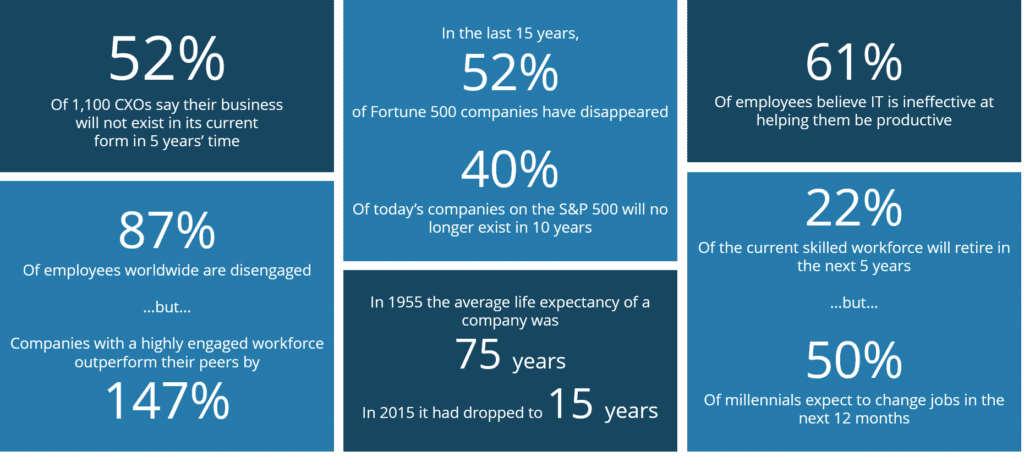
Each year The Poirier Group selects one of their consultants to attend the Consumer Goods Forum’s Future Leaders Program Conference. A prestigious opportunity among the firm, this year consultants Cody McCollough and Alli Gage attended the conference in Boston. Here, they met and interacted with like-minded professionals in the Retail and Tech industries, and learned a lot more than expected.
The 64th FLP Conference hosted 106 executives from 35 countries. The Conference was a 3-day programme of activities including frank talks by CEOs, collaborative workshops, networking opportunities and an exclusive Masterclass at Harvard Business School.
This year’s theme was “In Tech We Trust? Purposeful Leadership in Disruptive Times” which was highlighted perfectly throughout the conference in discussions, activities and presentations about tech, purposeful leadership and business disruption.
Some startling facts:

It’s safe to say that the workforce is changing rapidly and doesn’t appear to slow down anytime soon.
While the numbers above are shocking, they won’t scare you as much as the next:
Today more than 70 million devices are connected to the internet, but by 2021 more people will be connected to the internet than have clean water.
While it’s good to grow a company’s market share, it’s imperative that we do not ignore the plight of the people and planet around us. And the future of leadership will be about just that: it is no longer profit vs. purpose.
Profit is no longer enough.
Organizations of the future will need to have a unique sense of purposeful leadership and will to be successful. It is our purpose that will attract investors, employees and consumers alike. It is our purpose that will make us thrive.
There is no doubt that the Digital Era is transforming the workplace, the type of work we do and how we do it, faster than most people and organizations can keep up, but are the changes really what we’re expecting?
1. There is a looming fear that AI will take the jobs of skilled workers and that fear is real as we look around the changing landscape of industries such as production and manufacturing. It is only a matter of time before AI is being used in all industries. But, the key question is not a matter of replacing workers but augmenting workers.
The fact is, AI will actually create more than double the amount of jobs they will replace. This means that organizations need to train and hire to keep up with both technical skills AND soft skills like Emotional Intelligence and Critical Thinking.
2. Another key influencer of the rapidly changing workforce trends are our Millennials and Mobile Workers. They prove that what’s worked for organizations in the past, won’t work in the future when it comes to people practices. Currently 50% of Millenials expect to change jobs in the next 12 months.
And our mobile workers? By 2025 they will number more than 1 billion in Asia alone and will be 35-45% of the workforce.
As the graphic above illustrates, 87% of employees are disengaged. This is a striking number considering how many working hours that translates to per employee, per week and even per year. This indicates the need to adapt to the changing workforce. Companies need to invest in their employees to create internal trust, which in turn will create, or increase, external trust.
Richard Smucker, Chairman of the Board at Smuckers spoke about how Smuckers’ principles-based company has found success by empowering and embedding leadership at all levels of their organization. He urges that “Companies need to take the lead where governments won’t.” They need to have the courage and integrity to do what’s right and lead with the understanding that your job as a leader is to promote the strengths and improve the weaknesses of your employees.
Long gone are the days when your employees are just a number in your organization. Businesses are becoming increasingly aware of the need to encourage the individuals who work at their company in order to foster a culture of inclusivity and engagement.
It will be inevitable that despite the increase of technology capabilities, people will be at the heart of the 4th industrial revolution. Organizations that are able to understand and make the appropriate transformations will become the organizations of the future.
And the others? They will go the way of Pan Am and Standard Oil.